Despite all the controversies, the IPL's brand value hasn't diminished. Instead, says Harish Kotian/Rediff.com, the IPL made the BCCI richer by over Rs 3 billion!
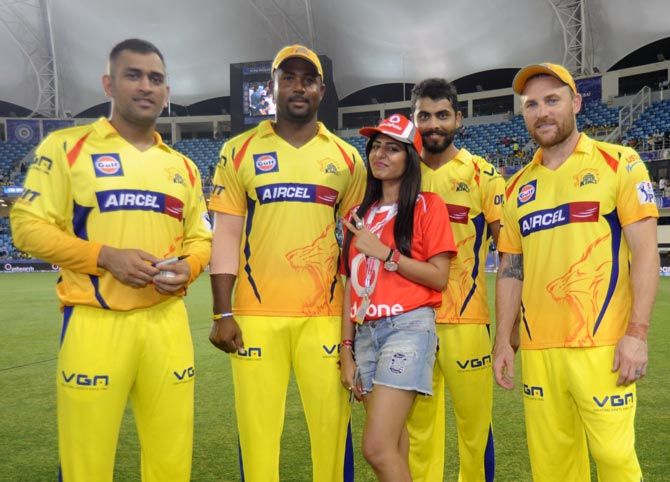
The bigger the controversy, the better it is proving for the Board of Control for Cricket in India and the Indian Premier League.
The Chennai Super Kings and Rajasthan Royals were banned for two years by the Supreme Court-appointed Justice Rajendra Mal Lodha Committee after its officials were found guilty of being involved in the betting scandal that hit the cash-rich Twenty20 league in 2013.
The BCCI suspended the two franchises and invited tenders for two new teams for the next two years, hoping to fill up for the gap temporarily.
Despite all the controversies, the IPL's brand value has not diminished. Instead, it made the BCCI richer by over Rs 300 crore (Rs 3 billion).
With the hope of attracting more bidders, the BCCI adopted the reverse bidding technique to decide on the replacements for the Chennai and Rajasthan franchises.
Many including the BCCI must have been left surprised by what transpired on Tuesday, December 8. The Pune franchise was bought by Kolkata business tycoon Sanjiv Goenka's company, New Rising, while Intex Mobiles bought the Rajkot franchise, while agreeing to pay Rs 10 crore (Rs 100 million) and Rs 16 crore (Rs 160 million) per year respectively for the two-year deal.
"Look these two franchises have said they do not want Rs 70 crore (Rs 700 million) from the (BCCI's) central revenue pool earmarked for franchises each year. In addition, they are paying us Rs 16 and Rs 10 crore per year for the next two years. This means in one year we are making Rs 166 crore (Rs 1.66 billion) and for two years it becomes Rs 332 crore (Rs 3.32 billion)," says senior BCCI official Niranjan Shah, explaining the calculation.
Following the addition of the two new teams for the IPL's next two editions, a look at the journey of the teams in the T20 tournament over the last eight seasons.
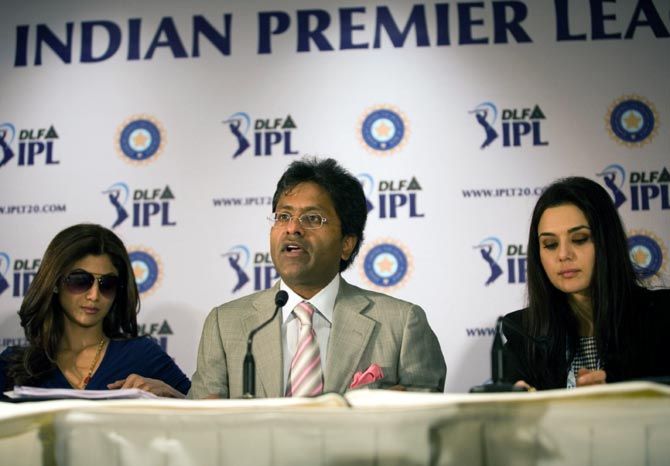
The IPL was launched with much fanfare in 2008. Bollywood stars and business tycoons clamoured to buy a team in what was called a marriage of cricket and showbiz.
India's biggest conglomerate, the Mukesh Ambani-owned Reliance Industries, snapped up the Mumbai Indians for a massive $111.9 million, the most expensive purchase then. After a not-too-good beginning, the Mumbai Indians won the tournament twice, in 2011 and 2013.
Royal Challengers Bangalore was bought by Vijay Mallya's UB Group for $111.6 million. RCB are yet to win an IPL title, though the team finished runners-up in 2011.
The Chennai Super Kings was bought by then BCCI treasurer Narayanswami Srinivasan's India Cements group for $91 million. CSK are the most successful team in IPL history, having won the tournament twice, in 2010 and 2011, while finishing runners-up thrice.
CSK was suspended for two years from the tournament by the Justice Rajendra Mal Lodha Committee after top CSK official Gurunath Meiyappan, Srinivasan's son-in-law, was found guilty of illegal betting during IPL6 in 2013.
The Delhi Daredevils, bought by the GMR Group for $84 million, are the worst performing team in the IPL. The Daredevils made it to the semi-finals in the first two seasons, but since then have progressed to the play-off stages just once thereafter.
Shah Rukh Khan and Juhi Chawla teamed up to buy the Kolkata Knight Riders franchise for $75 million.
The IPL's glamour boys, KRR fared miserably in the first few seasons but raised their game to win two of the last four seasons.
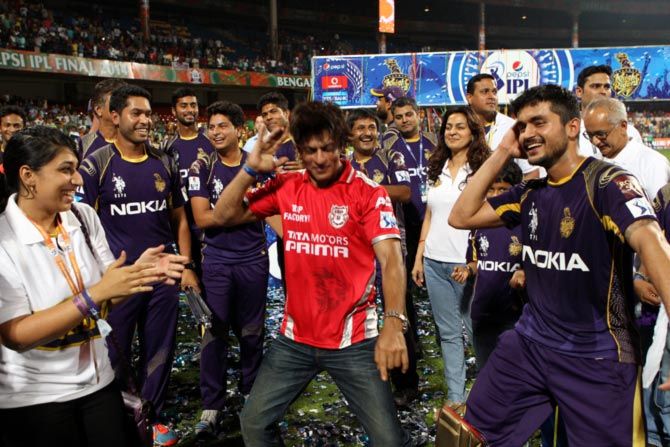
The Deccan Chargers, who were bought by Deccan Chronicle Holdings Ltd for $107 million, were shock winners in the second IPL in 2009. The team lasted another three seasons before being axed from the tournament in 2012 for breaching contract terms.
Rajasthan Royals was the least expensive franchise in the IPL when it was bought by Emerging Media for $67 million. The Royals surpassed all expectations by winning the inaugural IPL in 2008 under Australian legend Shane Warne's inspirational captaincy.
But the Royals have failed to match up to those lofty standards, making it to the play-offs just twice in seven attempts.
In 2011, the BCCI terminated the Royals' contract and that of Kings XI Punjab before the Bombay high court allowed both teams to participate in the IPL.
But the Royals were dealt a major blow in 2013 when three of its players -- Shantakumaran Sreesanth, Ankeet Chavan and Ajit Chandila -- were arrested for alleged involvement in spot-fixing.
A couple of years later, the Royals were been banned for two years after co-owner Raj Kundra was found guilty of illegal betting.
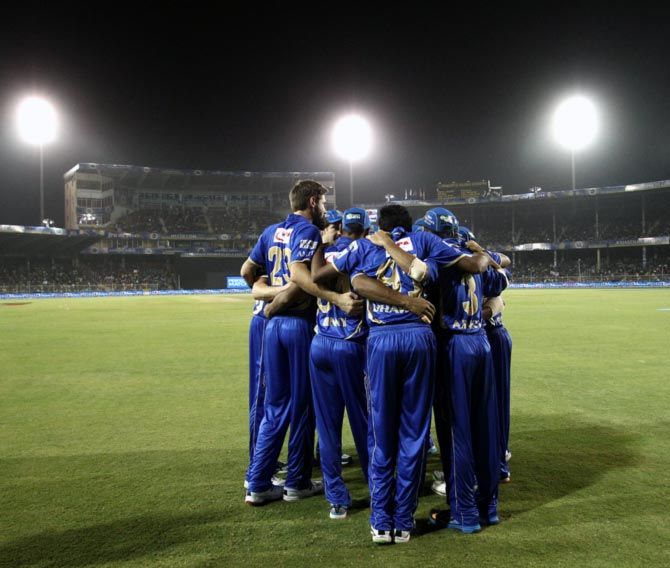
The Kings XI Punjab was bought by a consortium comprising Bollywood star Preity Zinta and her then boyfriend businessman Ness Wadia among others for $76 million. Kings made it to the last four stage in 2008, but since then have made it past the league stage just once in seven attempts.
In 2010, the IPL added two more teams before the fourth season. Sahara India Pariwar bought the Pune franchise for a massive $370 million, while Rendezvous Sports World Limited bagged the Kochi team for $333.3 million.
The Kochi Tuskers Kerala franchise lasted just one season before it was axed by the BCCI for breaching the terms of the agreement. The Kochi owners won a lengthy legal battle when the BCCI was asked to pay Rs 550 crore (Rs 5.5 billion) to them after an arbitration ruled in their favour earlier this year.
Pune Warriors India pulled out of the IPL after just three seasons in 2013. The franchise, which failed to go past the league stages in three seasons, pulled out of the IPL hours before the players auction in 2013.
The Sun TV network-owned Sunrisers Hyderabad stepped into the cricketing arena in 2013 when it took over the Hyderabad franchise following the termination of the Deccan Chargers for around $15 million per year. The team made it to the play-offs in its first year, but have failed to progress beyond the group stages in the last two seasons.
With the Chennai and Rajasthan franchises banned for two years, the BCCI moved in swiftly and floated tenders to replace the two teams for the ninth IPL season in 2016. Many felt it was a stop-gap arrangement. But the value of the new franchises exceeded all expectations.
Kolkata tycoon Sanjiv Goenka's company New Rising bought the Pune franchise for Rs 100 million a year. Intex Mobiles will pay Rs 160 million a year for the Rajkot franchise.
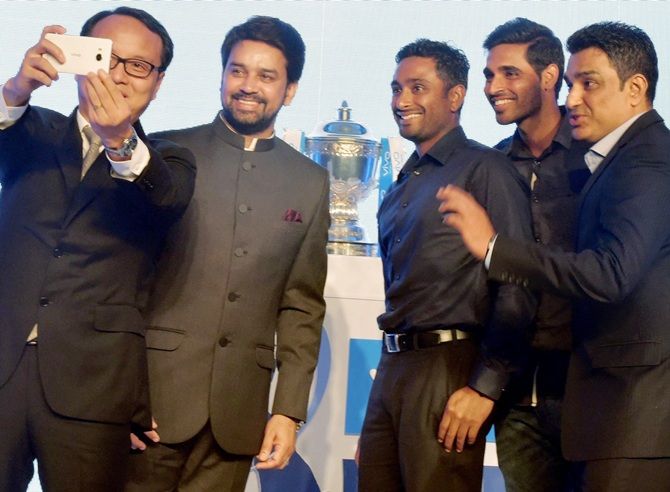
Another indication of the IPL's huge appeal was provided when PepsiCo pulled out as the title sponsor of the T20 league this autumn. Pepsi's five-year deal was to end in 2017.
The BCCI didn't need to work hard to find a replacement. Chinese mobile company Vivo jumped in as the IPL's title sponsor.
'We had four interested parties for the IPL title sponsorship, and the other three (apart from Vivo) are still interested in coming on board in other ways,' BCCI Secretary Anurag Thakur had said then.
It will be interesting to see what the BCCI does after the end of the two years. Will it retain Pune and Rajkot after the return of CSK and the Royals and make it a 10-team affair or stick to its original plan of eight teams?








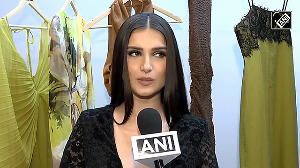
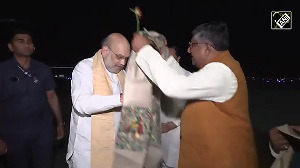
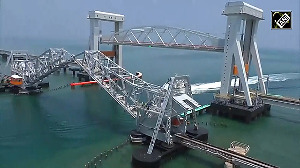

 © 2025
© 2025